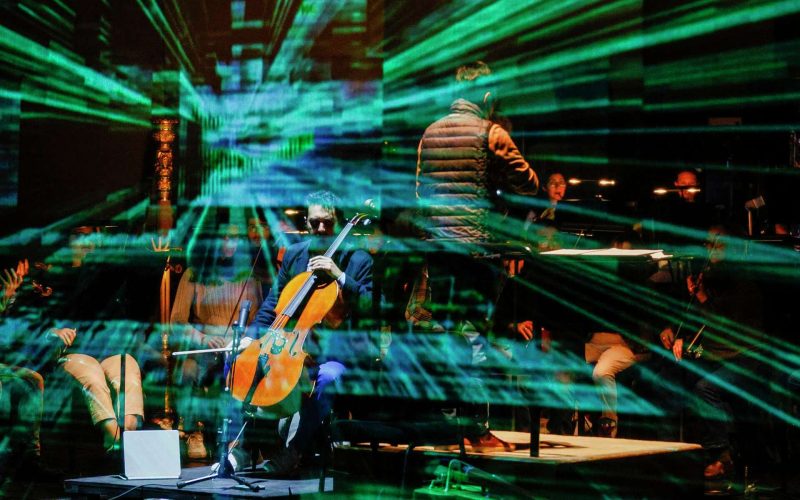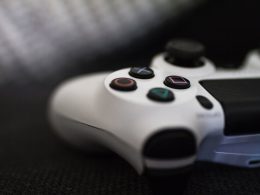Introduction
The music industry has always been a fertile ground for technological innovation. From the invention of the phonograph to the rise of digital streaming, each technological leap has fundamentally reshaped how music is created, distributed, and consumed. In recent years, the advent of artificial intelligence (AI) has introduced a new paradigm in music production, promising to revolutionize the field in unprecedented ways. This article delves into the impact of AI on music production, exploring the latest trends and innovations that are shaping the future of the industry.
The Evolution of Music Production
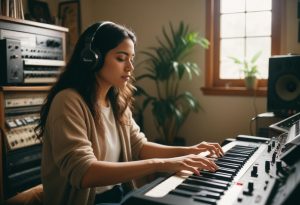
-
Early Days
Music production has come a long way since the days of analog recording. The early 20th century saw the birth of the recording industry, with artists and producers relying on rudimentary equipment to capture live performances. The introduction of multi track recording in the 1950s allowed for greater creative control, enabling producers to layer multiple sounds and create more complex compositions.
-
Digital Revolution
The digital revolution of the 1980s and 1990s brought about a seismic shift in music production. Digital Audio Workstations (DAWs) like Pro Tools and Logic Pro became the industry standard, offering unprecedented flexibility and precision. The rise of digital synthesizers and samplers further expanded the sonic palette available to musicians, paving the way for new genres and styles.
The Advent of AI in Music Production
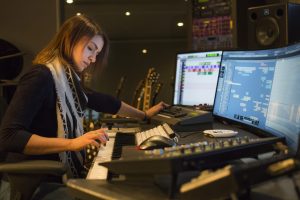
-
What is AI Music Production?
AI Music Production refers to the use of artificial intelligence technologies to assist in the creation, arrangement, and mixing of music. This can range from simple algorithms that generate chord progressions to sophisticated systems capable of composing entire songs.
-
Key Technologies
- Machine Learning: Machine learning algorithms analyze vast amounts of data to identify patterns and make predictions. In music production, these algorithms can be trained on large datasets of musical compositions to generate new pieces that mimic the style of the originals.
- Natural Language Processing (NLP): NLP technologies enable AI systems to understand and generate human language. This is particularly useful in songwriting, where AI can assist in generating lyrics that fit a given theme or mood.
- Neural Networks: Neural networks are a type of machine learning model that excels at recognizing complex patterns. In music production, neural networks can be used to analyze audio signals and apply effects like reverb, compression, and equalization.
Trends in AI Music Production
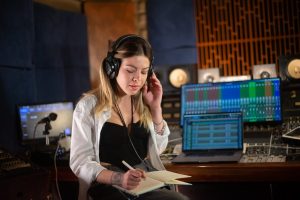
-
Automated Composition
One of the most exciting trends in AI Music Production is automated composition. AI systems like OpenAI’s Muse Net and Google’s Magenta can generate original compositions in a variety of styles, from classical to jazz to pop. These systems use machine learning algorithms to analyze existing compositions and generate new pieces that adhere to the same musical rules.
-
AI-Assisted Mixing and Mastering
Mixing and mastering are critical stages in music production that require a high level of technical skill and experience. AI technologies are now being used to automate these processes, offering tools that can analyze a mix and make adjustments to optimize the sound. Services like LANDR and iZotope’s Ozone use AI algorithms to provide automated mastering, making professional-quality sound more accessible to independent artists.
-
Lyric Generation
Writing lyrics is often one of the most challenging aspects of songwriting. AI systems equipped with NLP capabilities can assist in this process by generating lyrics that fit a given theme or mood. Tools like OpenAI’s GPT-3 can generate coherent and contextually appropriate lyrics, providing a valuable resource for songwriters.
-
Personalized Music
AI is also being used to create personalized music experiences. Platforms like Endel use AI algorithms to generate music that adapts to the listener’s environment and mood. This technology has applications in wellness, gaming, and other areas where personalized soundscapes can enhance the user experience.
Innovations in AI Music Production
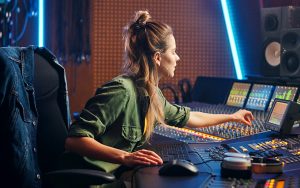
-
Deep Learning Models
Deep learning models, a subset of machine learning, have shown remarkable promise in music production. These models can analyze vast amounts of audio data to learn complex patterns and generate highly realistic sounds. For example, OpenAI’s Juke deck uses deep learning to create royalty-free music tracks that can be customized to fit different moods and styles.
-
Generative Adversarial Networks (GANs)
Generative Adversarial Networks (GANs) are another innovative technology making waves in AI Music Production. GANs consist of two neural networks a generator and a discriminator—that work together to create realistic audio. The generator creates new audio samples, while the discriminator evaluates their quality. This iterative process results in highly realistic and innovative musical compositions.
-
AI-Driven Plugins
AI-driven plugins are becoming increasingly popular in the music production community. These plugins use machine learning algorithms to analyze audio signals and apply effects in real-time. For example, plugins like Neutron by iZotope use AI to assist in mixing by suggesting optimal settings for EQ, compression, and other effects.
-
Collaborative AI Tools
AI is also enabling new forms of collaboration between human musicians and machines. Tools like Amper Music allow users to create custom music tracks by selecting different musical elements, which the AI then arranges into a cohesive composition. This collaborative approach allows musicians to leverage AI as a creative partner, rather than a replacement.
Ethical Considerations
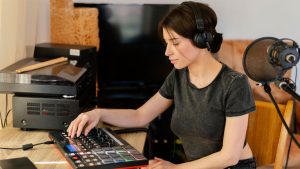
-
Copyright and Ownership
The use of AI in music production raises important questions about copyright and ownership. If an AI system generates a piece of music, who owns the rights to that composition? This is a complex issue that will require new legal frameworks to address.
-
Creative Authenticity
There are also concerns about the impact of AI on creative authenticity. Some critics argue that music created by AI lacks the emotional depth and authenticity of human-created music. As AI becomes more prevalent in music production, it will be important to find ways to balance technological innovation with artistic integrity.
Conclusion
AI Music Production is poised to revolutionize the music industry, offering new tools and capabilities that can enhance creativity and streamline the production process. From automated composition to AI-assisted mixing and mastering, the possibilities are virtually limitless. However, as with any technological advancement, it is important to consider the ethical implications and strive for a balance between innovation and artistic integrity. As we move forward, the collaboration between human musicians and AI will undoubtedly lead to exciting new developments and opportunities in the world of music.






